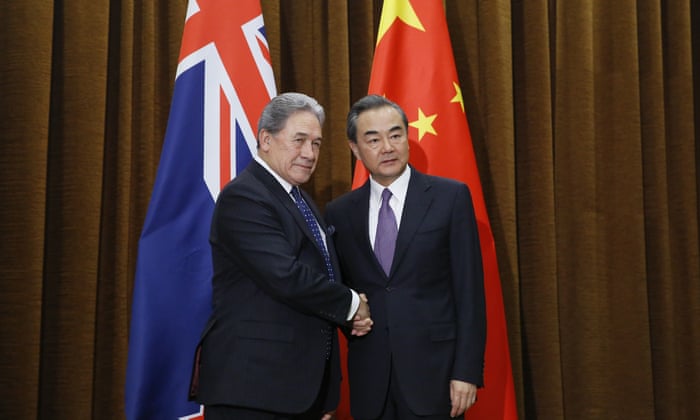By Ben Westcott


Six retired US military leaders have issued a statement calling on America's allies to ban Chinese technology giants from outfitting their 5G networks, citing "grave concerns" over security.
The statement, released Wednesday, was signed by six highly-respected, retired US military officials, including former Director of National Intelligence James Clapper and former NATO Supreme Allied Commander in Europe James Stavridis.
"As military leaders who have commanded US and allied troops around the world, we have grave concerns about a future where a Chinese-developed 5G network is widely adopted among our allies and partners," the statement began.
The joint statement comes as New Zealand Prime Minister Jacinda Ardern refuted suggestions that Chinese technology company Huawei had been banned in her country.
Huawei is one of China's largest technology companies and in recent years has become one of the most widely-used providers of super-fast 5G network technology globally.
The statement, released Wednesday, was signed by six highly-respected, retired US military officials, including former Director of National Intelligence James Clapper and former NATO Supreme Allied Commander in Europe James Stavridis.
"As military leaders who have commanded US and allied troops around the world, we have grave concerns about a future where a Chinese-developed 5G network is widely adopted among our allies and partners," the statement began.
The joint statement comes as New Zealand Prime Minister Jacinda Ardern refuted suggestions that Chinese technology company Huawei had been banned in her country.
Huawei is one of China's largest technology companies and in recent years has become one of the most widely-used providers of super-fast 5G network technology globally.
"I've seen some suggestion that Huawei products have been banned in New Zealand, that's simply not the case," said Ardern, during an interview broadcast on Chinese state media CGTN.
"We already have Huawei products in New Zealand and Huawei already operates in New Zealand," she added.
The Trump administration has been pushing hard for diplomatic partners to remove Huawei technology from their networks, claiming the company is too close to the Chinese government.
New Zealand is a longtime ally of the United States and a member of their exclusive Five Eyes intelligence sharing community, along with Australia, the United Kingdom and Canada.
A former US government analyst Peter Mattis said in 2018 that New Zealand's membership of the group should be reconsidered given its close relationship with Beijing.
In their statement, Wednesday, the US military leaders highlighted three areas of concern over a growing presence of Chinese technology in international networks -- espionage, risks to future military operations and undermining democracy and human rights.
"The Chinese Cyber Security Law and other national strategies like 'military-civil fusion' mean that nothing Chinese firms do can be independent of the state. Firms must support the law enforcement, intelligence, and national security interests of the Chinese Communist Party," the statement said.
They claimed calls for the US intelligence community to produce evidence, or a "smoking gun," to justify calls for a ban "misunderstand the challenge at hand."
"We already have Huawei products in New Zealand and Huawei already operates in New Zealand," she added.
The Trump administration has been pushing hard for diplomatic partners to remove Huawei technology from their networks, claiming the company is too close to the Chinese government.
New Zealand is a longtime ally of the United States and a member of their exclusive Five Eyes intelligence sharing community, along with Australia, the United Kingdom and Canada.
A former US government analyst Peter Mattis said in 2018 that New Zealand's membership of the group should be reconsidered given its close relationship with Beijing.
In their statement, Wednesday, the US military leaders highlighted three areas of concern over a growing presence of Chinese technology in international networks -- espionage, risks to future military operations and undermining democracy and human rights.
"The Chinese Cyber Security Law and other national strategies like 'military-civil fusion' mean that nothing Chinese firms do can be independent of the state. Firms must support the law enforcement, intelligence, and national security interests of the Chinese Communist Party," the statement said.
They claimed calls for the US intelligence community to produce evidence, or a "smoking gun," to justify calls for a ban "misunderstand the challenge at hand."
"The onus should instead be on Beijing to explain why it is prudent for countries to rely on Chinese telecommunications technology when Beijing's current practices threaten the integrity of personal data, government secrets, military operations, and liberal governance," the statement said.
New Zealand's Ardern wrapped up a two-day visit to China at the beginning of this week, a visit which was intended to shore up somewhat-rocky relations between the two nominally friendly nations.
It was a decision by New Zealand's security services to recommend against the use of Huawei technology which led to the reported rift.
But when asked during her interview with Chinese state media if US objections to Huawei would influence New Zealand policy, Ardern said no.
"New Zealand has not been pressured in that regard but even, regardless, it would make no difference. We determine our policy and our position on these matters," she said.
New Zealand's Ardern wrapped up a two-day visit to China at the beginning of this week, a visit which was intended to shore up somewhat-rocky relations between the two nominally friendly nations.
It was a decision by New Zealand's security services to recommend against the use of Huawei technology which led to the reported rift.
But when asked during her interview with Chinese state media if US objections to Huawei would influence New Zealand policy, Ardern said no.
"New Zealand has not been pressured in that regard but even, regardless, it would make no difference. We determine our policy and our position on these matters," she said.
